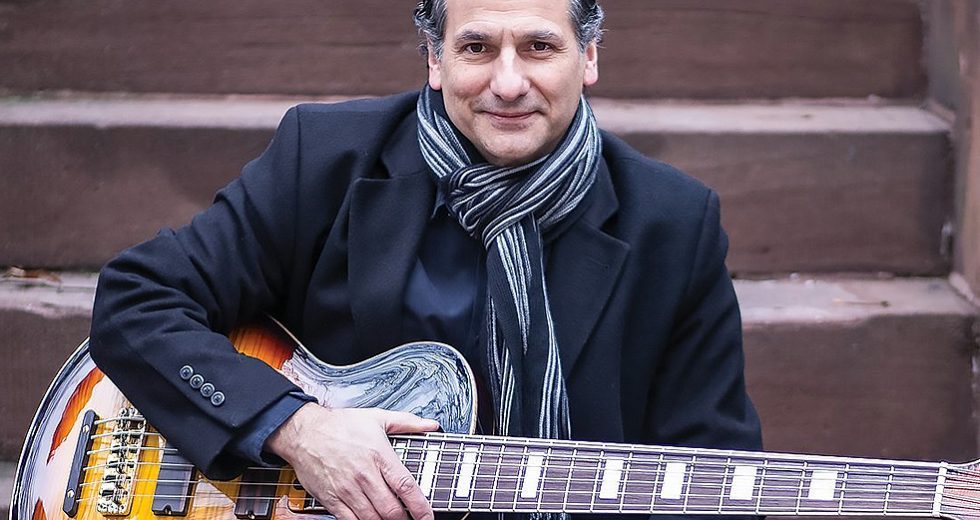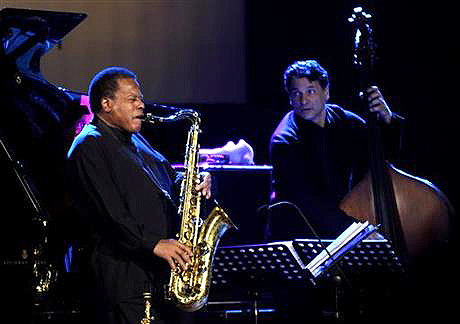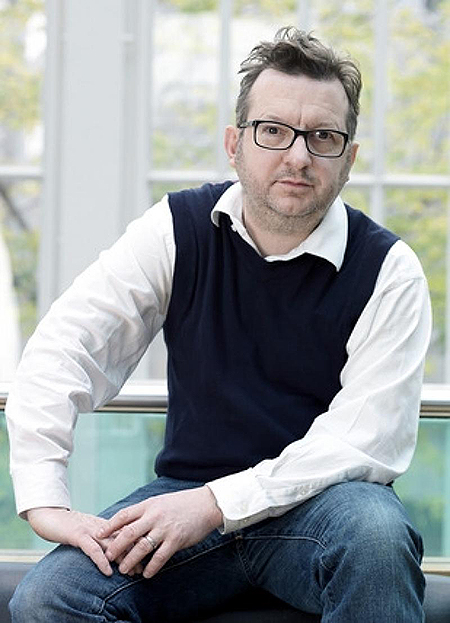
“Here’s this guy from nowhere. Who grew up in a family that was not wealthy and not connected to music. And things can happen.”
As John Patitucci goes on to explain, things did happen. When he frames the story of how he became one of hottest bass players in the business, it’s a group shot, not a self-portrait. He’s performed with Herbie Hancock, Stan Getz, Pat Metheny, Wynton Marsalis, Chick Corea (since 1985). And now, with Wayne Shorter.
When Shorter brings his quartet to Orchestra Hall for a performance May 27 on the SCP Jazz Series, Patitucci will be grooving right alongside the sax master, doing what he dreamed of doing when he was a kid.
It started with his older brother.
“He played electric guitar, and I idolized him. I tried to play guitar, too, but I’m a lefty, and in the early ’60s, there weren’t many left-handed instruments around,” Patitucci recalls. “I struggled with the guitar, playing righty, but didn’t like the pick.”

John Patitucci (right) has played bass in the Wayne Shorter Quartet since 2000. The quartet will perform May 27 at Symphony Center.
He picked up some bongos and was banging away on them, digging the rhythm, when his brother handed him an electric bass. Turned out he had “a drummer’s heart” and the heart fell in love with the bass.
“So I played electric bass at age 10, and added to that the acoustic bass at age 15, when I was big enough to hold one,” he says. “For the past 40-plus years, I’ve been playing both.”
As a kid, he listened to a lot of rhythm & blues. James Jamerson of Motown’s house band, the Funk Brothers, was a guiding light. He was stirred by the blues of B.B. King. But when his grandfather gave him an Art Blakey & the Jazz Messengers record (featuring Shorter), he discovered what moved him the most.
Today, Patitucci considers himself a third-generation electric bassist, following Monk Montgomery, brother of guitarist Wes Montgomery, then Stanley Clarke and Jamerson. “It’s pretty incredible how the instrument has developed from the acoustic bass of the ’30s.”
His own musical history includes stints with Corea’s Elektric Band and Akoustic Band — albums that Patitucci arranged and produced won two Grammy Awards (one for playing and one for composing) and 15 Grammy nominations. His performances and live recordings with Hancock’s Directions in Music quintet — and the Shorter quartet that will play Symphony Center — also have earned wide acclaim.
In 2015, Patitucci released “Brooklyn” on his own label, Three Faces Records, which he launched with his wife, Sachi. How that came about is another family tale.
“My brother-in-law started a film company to make documentaries, especially stories about families,” Patitucci says. “He came to me and said, ‘I’d like to do a documentary on you,’ and I said, ‘Why? Nobody wants to see that.’ He said, ‘Nah, it’s going to be great!’”

British composer Mark-Anthony Turnage collaborated with Patitucci on A Prayer Out of Stillness.
Patitucci told him he preferred to make a record, and his brother-in-law responded, “I’ll partner with you on that if you let me make the film.’”
Done. The film is “Back to Brooklyn.” Released in early 2016, it combines footage of rehearsals, performances and the recording of “Brooklyn” with his latest band, the John Patitucci Electric Guitar Quartet. The film also looks at Patitucci’s early years in Brooklyn, his music career and his home life through candid interviews with family and musicians. Hancock, Corea and Shorter also make appearances. (It’s available through www.augustskyfilms.com.)
“It’s about how family and music shaped me and how it propelled me into a life that I had no idea I would end up in,” he says. “I had dreams but no idea it would actually happen.”
Playing bass taps into his innate love of driving melody and harmony through rhythm. He calls the process “comprovising,” the melding of composition and improvisation: “You’re always composing a counterpoint.”
To explore a more formal approach, he studied classical music and learned orchestration in the tradition of Duke Ellington, George Gershwin and Shorter. He’s written chamber music, featuring bass, for the Elements and Turtle Island string quartets. British composer Mark-Anthony Turnage and Patitucci have collaborated on large projects for both acoustic and electric basses with string orchestra, notably A Prayer Out of Stillness.
And he continues to be inspired by his brother, now a pastor. “My faith is a huge part of my life,” he says. “I’ve been studying faith as it relates to art. There is a sense of gratitude that comes from being able to play music. It is a gift and a responsibility … to work at it and use it for good, for social change, for helping people in the world.”
He demonstrates his “missional passion” for social justice at the Berklee College of Music Global Jazz Institute as a visiting scholar. He takes his students to perform at places wherever the healing power of music, including prisons and nursing homes, is needed.
This fall, his daughter will be entering Berklee as a freshman. She recently posted a video of her and “The Pops” doing a sweet duet of the Beatles rarity “I’ve Just Seen a Face.” She sings, he strums.
And so the family business spans another generation.
“She’s writing lots of songs, playing guitar and piano,” Patitucci says. “She’s interested in exploring. Who knows where …”
Joe Pixler is a Chicago-based journalist and editor.